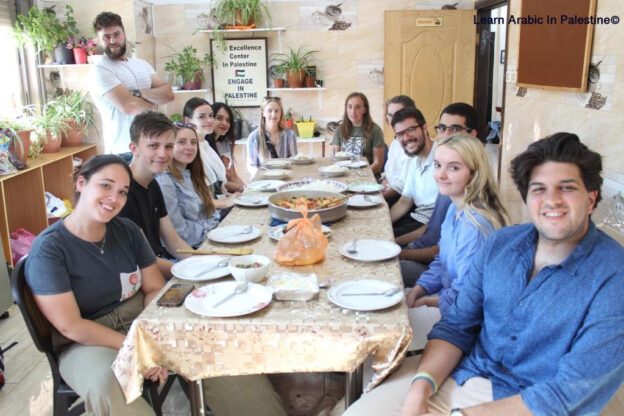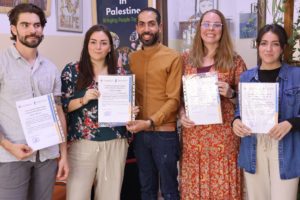Cooking Course In The West Bank, Palestine: Learn Arabic in Palestine invites people worldwide to attend Hebron and participate in our Palestinian cooking classes in Hebron, West Bank. It is a great chance to engage in the Palestinian culture and share meals with many people in Palestine. You will have the chance to meet a lot of Palestinians, learn Palestinian Arabic, and live daily life in Hebron, Palestine.
The cooking Palestinian food classes occur in our modern kitchen, kitchenette, and culinary space at Learn Arabic in Palestine. You will learn how to cook Palestinian vegetarian, vegan, and meat meals. You will also learn to make traditional Arabic dishes with local Palestinian cooks and be introduced to Mediterranean–Eastern recipes.
If you are looking for a cooking school in the West Bank, Palestine, and Israel, this cooking course is for you. The center in Hebron, West Bank, provides the best Cooking Classes in Palestine. Palestine and the Levantine countries are known for their delicious Arabic food. To know Palestine and the West Bank even better through the food, take one of the cooking classes. During the cooking lessons, you will learn about the Palestinian – Levantine food, culture, cooking, and spices. You will taste different traditional Arabic foods and sweets.
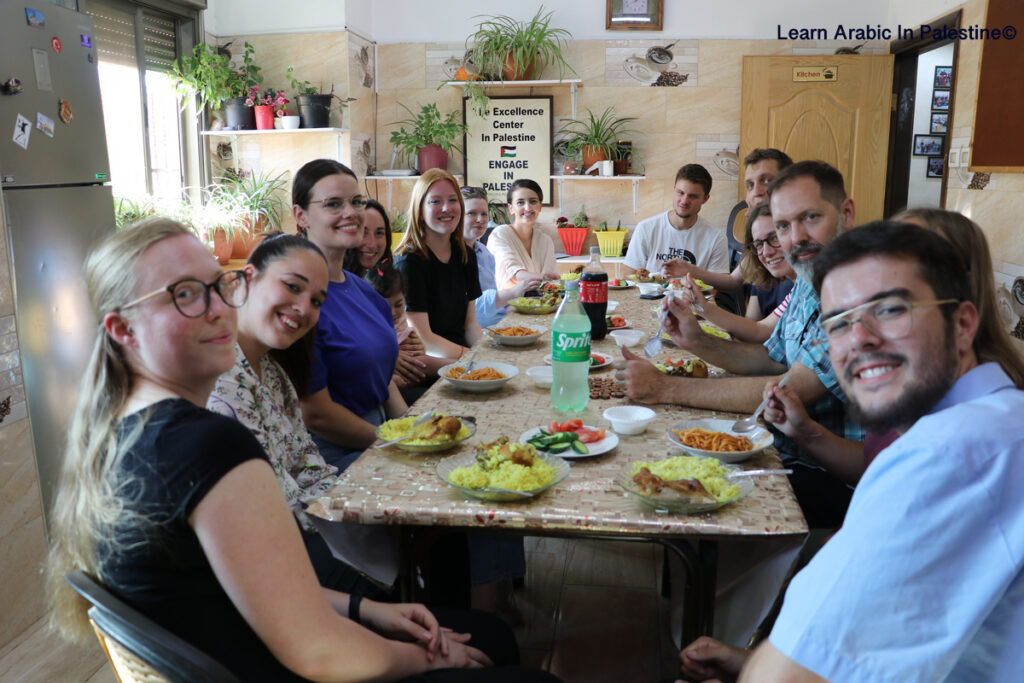
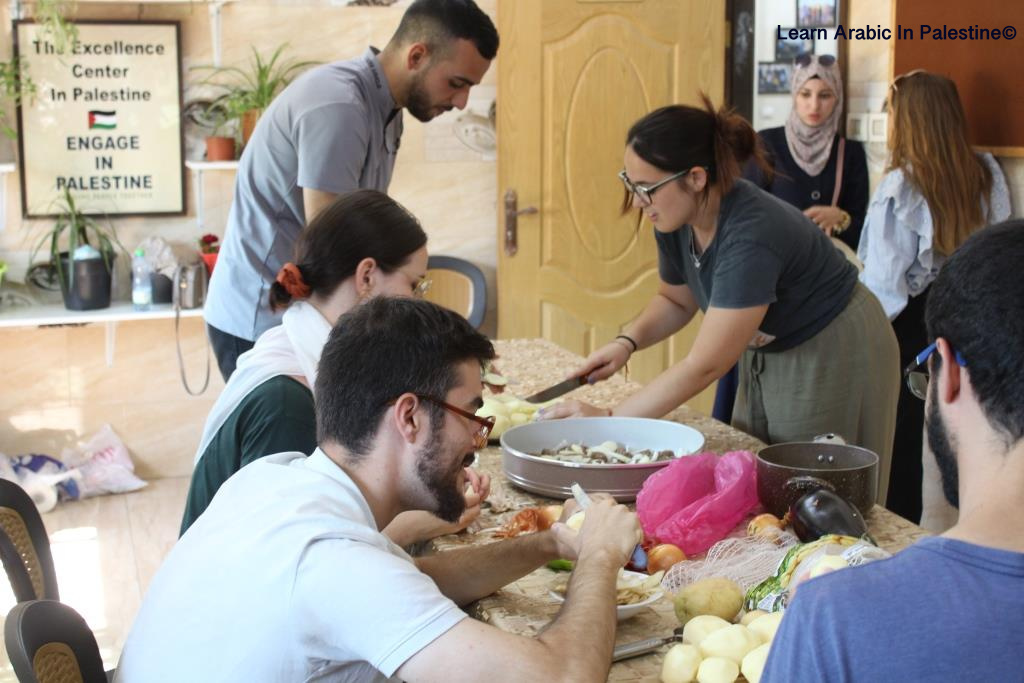
Table of Contents
Make a Special Palestinian Meal at Home
Working in our Palestinian kitchen allows you to participate in these fun, interactive Palestinian cooking sessions. We are sure you will enjoy our cooking classes in the West Bank, and you will be able to cook new recipes for your whole family back home. This means that you will always be able to produce a taste of Palestine wherever you are.
Food is Central to Palestinian Culture
Food is central to Palestinian culture. Friends and family typically gather around the table for a shared meal and great conversation. Friendships grow in the presence of multiple cups of coffee, tea, snacks, and sweets. Food is simply adored in Palestine, not only for satiating our hunger but also for the happy memories it helps us to create.
A wide variety of fruits and vegetables is available, and in some Palestinian homes you visit, you will be served fresh-cut fruits and/or vegetables. Sliced apples and oranges are common staples. You may also be served a blend of nuts and seeds or dried fruit when you visit with your host family or the homes of Palestinian friends that you make.
Where? When and Who Can Participate?
Learn Arabic in Palestine is looking for all travelers to the Levant region interested in cooking, Palestinian culture, and Palestine to participate in our Cooking in Palestine Program.
If you plan a trip to Palestine or Israel, consider visiting Hebron and participating in the Cooking Course in the West Bank, Palestine, for a few days to gain a rich and authentic cultural culinary experience at Learn Arabic in Palestine.
Brief Information About the Cooking Course
As a participant in this Cooking Course in the West Bank, Palestine program, you will spend your days in Learn Arabic in Palestine kitchen learning how to create tasty, traditional Palestinian meals. Maqluba, mansaf, hummus, falafel, Arabic coffee, and tea are a few of the possibilities that await.
We will take you through and show you step by step, how to prepare the most famous Palestinian dishes. By completing the program, you will walk away with culinary and cultural knowledge, satisfied taste buds, and new recipes to add to your collection.
Overview of Our Cooking Lessons in Palestine
| Location of the Cooking Course | Hebron, West Bank, Palestine |
| Program Language | English, Arabic |
| Cooking Course duration | 1-13 Weeks |
| Starting/ Ending Dates | Participants can freely choose their starting and ending dates. We offer cooking classes programs in Palestine year-round (Summer, Winter, Autumn, and Spring) |
| Monthly Costs Weekly Costs | €400 a week (confirm prices here) |
| Homestay in Hebron | Palestinian host family Male dorm Private (Additional fees apply) |
| Cooking course includes | Palestinian traditional food Vegan food Vegetarian food Palestinian cuisine |
| Form of the cooking course | Small groups (1-3) Private cooking class |
| Application Deadline | No Deadline |
| Reviews of our center | Reviews On Gooverseas.com Reviews On Goabroad.com Participants video testimonials |
Food in Palestine
Food is a central part of Palestinian culture. Much of the communal gathering occurs around the table for a shared meal and great conversation. In this program, you will gain knowledge about Palestinian cooking, culture, and customs, and you’ll also have the opportunity to live with a host family in Hebron, furthering your immersion. This allows you to experience daily life as a Palestinian, where you will be treated as part of the family, invited to participate in family activities and attend any family events and social gatherings.
Food is a great way to bring people together. The shared experience of preparing, sharing, and enjoying delicious meals helps build relationships and better understand the people in Hebron.
Host families provide exciting opportunities for international visitors to learn more about Palestinian culture, meet new people, and improve their Arabic language skills.
A Feast for Your Senses!
Of course, we all need to eat to live, but in Palestine, meal times are about more than just satisfying your hunger. Cooking and eating are social activities, and you will be able to smell the tantalizing aromas, see the varied colors of the ingredients, taste the delicious flavors, touch the food, discover the different textures, and hear the sounds of items sizzling in the pan, listen to the voices of those around you, laugh, chat and enjoy the occasion.
Something for Everyone
Trying a different cuisine can be a little scary for some people, but there is no need to worry. You will find a wide variety of foods available in Palestine, and there are certain to be several dishes that you will find to your taste.
Rice, meat, and plenty of different vegetables are widely available. There are also fruits grown locally, which you can enjoy when they are in season.
Vegetarian and Vegan Food in Palestine
It is perfectly possible to enjoy Palestinian food as a vegetarian or vegan. Although most Palestinians include meat in their diet, it is not difficult to create dishes without meat. There are many vegetarian foods, such as falafels and hummus, soup, mujaddara, tabbouleh, and many more. Most dishes can be adapted to become vegetarian. Finding vegan food may be a little more difficult, but options exist.
During the cooking courses in the West Bank, Palestine, you can select your own ingredients to suit your requirements. One of the regular additions to meals is vegan pita bread. Nobody needs to go hungry! Palestinian people are generally very hospitable, they want our international visitors to feel comfortable and happy and will do what they can to help you enjoy your stay.
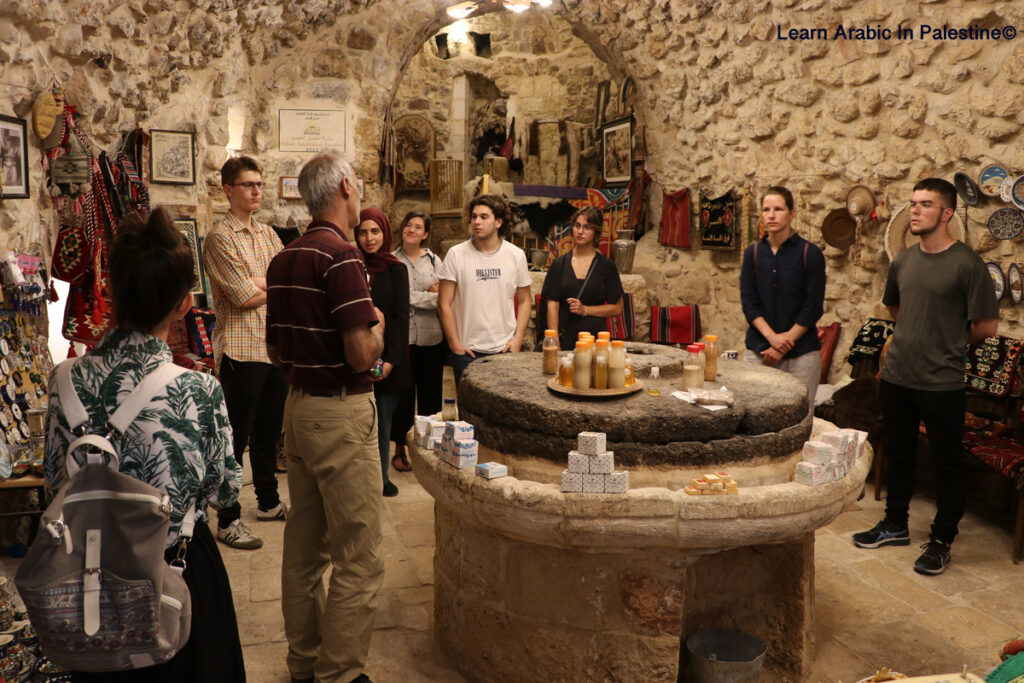
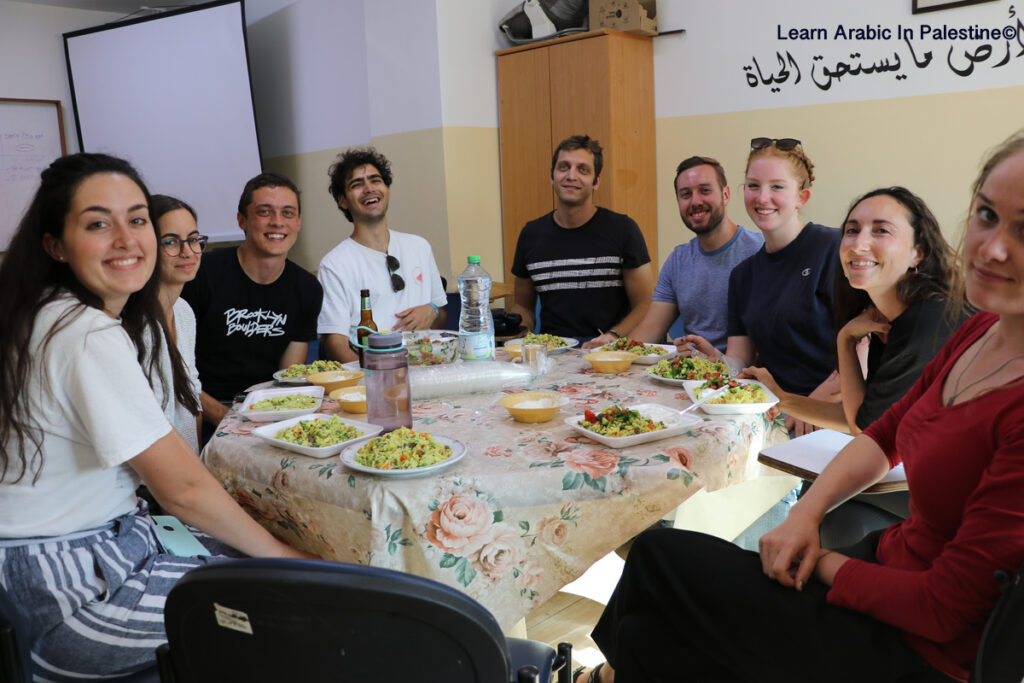
Sweet Treats
Palestine is famous for its sweets and desserts- if you have a sweet tooth, there are many tempting concoctions for you to try! You can also learn to make some of these dishes yourself. For example, Kinafah is one of the most famous and much-desired sweets for Palestinians. It was originally made in Nablus and is called “Kenafah Nabulsia“. It contains cheese pastry soaked in sweet, sugar-based syrup.
This isn’t the only delicious sweet you can find. Baklawa, Burma, Muhalabiyeh, Qatayef (mainly found in Ramadan), and many others exist.
Popular Palestinian Meals you can Learn to Make Include:
- Fasoulya Beyda: White beans cooked in tomato sauce and served with rice.
- Fasoulya Khadra: Green beans cooked with a tomato sauce and also eaten with rice;
- Kufta Bethinia: Meatballs (lamb or beef) cooked with Thinia (tahini) sauce and served with rice.
- Kufta bel-bandora: Meatballs cooked with tomato sauce and potatoes. It can be eaten with a spoon or with Pita bread.
- Mahshi Lift: Cooked mostly in Hebron, it is made from turnips stuffed with rice, minced lamb, and spices and cooked in Tamarind sauce.
- Mansaf Palestine: Lamb cooked in a fermented, dried yogurt sauce and served with rice or bulgur.
- Maqluba Literally means “upside-down” and is a dish that is made with fried Cauliflower or eggplant, meat (chicken/lamb), and rice.
- Musakhan: This is a common and preferred meal for Palestinians. The meal is easy to make, and the content is affordable and easy to obtain. The ingredients are: olive oil, sumac, pine nuts, chicken pieces, onions, and Taboon bread. The term ‘musakhan’ means “something that is heated.”
- Zarb: This is a different type of cooking where the meat (lamb or chicken) is cooked under high pressure in an airtight oven under the ground and served with rice and bread. Jordanians, especially those who live in the deserts, influence this way of cooking.
- Mujaddara: This is another popular meal that is very affordable. It is very easy to make, and the ingredients are available all year round. This meal contains lentils and rice with fried onions on the top.
When Can You Join the Cooking Course in Palestine?
You can join Learn Arabic in Palestine at any time throughout the year. We will work with you to find a time that suits you best. With this program, you’ll choose your cooking adventure’s start and end dates with us in Palestine.
If you are in the midst of planning a trip to Palestine, consider staying one or more days with EC in Hebron for a one-of-a-kind cultural cooking experience. From your very first meal, you will enjoy this enriching time in Hebron with Learn Arabic in Palestine.
Program Fees for Cooking Courses in Palestine
The Cooking Course in Palestine fees include pre-departure support, accommodations with a local host family, breakfast, program assistance & coordination while in Palestine, three hours of Arabic lessons, and some visits to different sites in the city of Hebron.
As stated, the program fee includes 3 hours of private Arabic lessons a week or 12 hours a month. If you are interested in continuing to study Arabic once the Cooking in Palestine Program ends, then we at Learn Arabic in Palestine are more than happy to organize this for you. At the Center, we host Arabic students who come to Palestine year-round to enhance their language skills. You will be welcome.
Which Airport Should I Start Checking for Flights to Palestine?
Unfortunately, there are no airports in Palestine; flying directly into the West Bank is currently impossible. Palestinians use either the airports in Jordan or Egypt to travel abroad. However, internationals can fly to Israeli airports and then cross to Palestine. We believe the easiest ways to get to Learn Arabic in Palestine in Hebron are:
- To fly to Ben Gurion, Tel Aviv Airport (Israel). It takes two and a half hours from the airport to Learn Arabic in Palestine in Hebron via shared Taxi.
- You can fly to Eilat airport in Israel and then travel by booking a shuttle or taking a bus to Jerusalem and then to Hebron. The whole trip can last between 6-7 hours.
- You can also fly to Queen Alia International Airport in Amman, Jordan, and then cross to Palestine, but this route takes more time and is more expensive.
Reviews and Awards
Learn Arabic in Palestine has been honored with several prestigious Community Awards, and it has been recognized as the Best Language School and Top Volunteer and Internship Program Provider for the years 2019, 2021, 2022, 2023, and 2024. For more details, please visit our profiles on GoOverseas.com and GoAbroad.com.
- +850 Reviews and ratings (96.8%) on gooverseas.com
- +175 Reviews and ratings on goabroad.com
- Participants’ video testimonials
Further Information
Should you have any questions about our cooking program, please do not hesitate to contact us at Info@ecpalestine.org with the subject line of the Cooking Course in the West Bank Palestine.
Conclusion
Engaging in a cooking course with Learn Arabic in Palestine in Hebron offers a unique opportunity to immerse yourself in Palestinian culture through its rich culinary traditions. Participating lets you prepare traditional dishes such as maqluba, mansaf, hummus, and falafel, guided by local cooks in a modern kitchen setting. This hands-on experience enhances your cooking skills and deepens your understanding of Palestinian customs and daily life.
Food is central to Palestinian society, serving as a medium for social gatherings and cultural expression. Through this program, you’ll experience the hospitality and warmth of Palestinian families, often sharing meals that feature a variety of fruits, vegetables, and traditional sweets like kinafah and baklawa. Living with a host family further enriches this experience, allowing for authentic cultural exchange and the opportunity to practice Arabic language skills.
Whether you’re a seasoned cook or a culinary novice, this program caters to all skill levels, offering personalized instruction in small groups or private classes. With flexible scheduling and year-round availability, you can choose the duration and timing best for your travel plans. The program fee includes accommodations, breakfast, Arabic lessons, and guided visits to local sites in Hebron, ensuring a comprehensive and memorable experience.
By joining Learn Arabic in Palestine’s cooking course, you’ll learn to recreate delicious Palestinian meals and gain a deeper appreciation for the cultural significance of food in Palestine. This immersive experience promises to leave you with lasting memories, new friendships, and the skills to bring a taste of Palestine to your own kitchen.
Important and Related Articles – Please Click to Read
Contact Us
Should you have any questions, please do not hesitate to contact us at:
WhatsApp:+972 599 479 880
Website: https://ecpalestine.org/
EC Website: https://excellencenter.org/
Instagram: https://www.instagram.com/excellence.center
Facebook page: https://www.facebook.com/ExcellenceCenter
